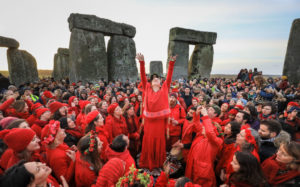Once the bankers have gone home for the night, the City of London becomes a mysterious place. It evinces secrecy and subversion; you can feel the presence of something arcane beneath the day-to-day custom and commerce of the City.
It used to be a hotspot for secret societies and occultists, such as Aleister Crowley and Francis Bacon. And it was here that the 17th-Century English philosopher would allegedly associate with a group of Rosicrucians — a Western esoteric movement based on Kabbalistic and gnostic thought.
This sense of rebellion is not confined to the past; swathes of millennials and Gen-Zers are turning to online occultism and ritual magic in what seems like a rebellion against modern disenchantment.
Digital forms of New Age spirituality go especially viral on TikTok (or WitchTok) — from virtual trans-Atlantic covens gathering to cast spells on politicians (and planets), to the idea of “manifestation” that is currently in vogue. These trends are paired with politics, where magic is channelled into anti-capitalist “spiritual activism”.
Occultism tends to attract young people because it appears subversive. The idea of Francis Bacon and his cabal of Rosicrucians practising magic behind closed doors seems inherently subcultural; a mark of an “alternative lifestyle”. Even the word itself — derived from the Latin occultus, meaning “hidden” — suggests something dissident; a left-hand path leading away from the masses. Its compatibility with anti-establishment sentiments thus tends to go unquestioned.
Today, though, these connotations are deceptive. While occultism may have been subversive in the context of 16th and 17th-century religious societies, it rapidly ceased to be so with the birth of modernity. Why? Because the heirs of Western occult philosophy were also the heirs of the secular liberalism and capitalism that dominates the West today.
Far from being a black sheep in Western intellectual history, it was Bacon — along with Hobbes, Locke, and Hume — who laid down the norms of our time. He was the father of British empiricism and the scientific method: the cornerstone of liberal, rationalistic modernity.
Bacon was one of the most proactive actors in building a world free from tradition and “superstition”. He was part of the same revolt against religion that brought about the Age of Reason, and, ultimately, the materialist dogmas upheld by contemporary science, philosophy and politics. On a more conceptual level, Western occultism came hand-in-hand with the founding principle of the modern age: Man’s domination over nature.
It is no coincidence that Bacon straddled both worlds, when both emerged from the same reaction against religion and the will to seek more “rational” and autonomous ways of arriving at truth. Liberal capitalism and occultism are both fruits of the Enlightenment. Both place man at the very centre of the universe, attempting to emancipate him from the constraints of tradition and the natural world itself. Both also attempt to manipulate nature, be that with magic or brute force. Though one clings onto a veneer of transcendence and the other admits to its own materialism, both tend towards this same end: “liberating human beings from fear and installing them as masters”.
At least, this is what the early critical theorists Theodore Adorno and Max Horkheimer saw as the Enlightenment’s end game. For them, the subjugation of nature that was justified by 17th century rationality was inextricably linked to “‘bourgeois liberalism” and capitalism — even though, ironically, they themselves ended up subscribing to the very materialism and atheism that defined these systems.
Given that this subjugation of nature is precisely what motivated Bacon to pursue the occult, it is clear that Western esotericism does not subvert the impulse behind capitalism, but compliments it. Nothing sums this up more perfectly than the “magick” of Aleister Crowley, the West’s most influential occultist after Bacon, which he based on the sole principle of “do what thou wilt”; a sentiment which can hardly be distinguished from that of modern liberalism.
This overlap is strongly felt in the New Age movement of the Sixties and Seventies — a strange and self-contradictory synthesis of quasi-transcendent freedom and consumerist self-actualisation. Despite its reputation for rebellion, the flower power generation only took the grounding principle of Enlightenment liberalism a step further, overthrowing tradition and nature in ways more forceful than ever before. Their attraction to the occult was hardly subversive; it simply served the 17th century urge to make man (and now, with birth control, woman) master of nature.
Despite the deeply entangled roots of the Enlightenment and occult spirituality, the latter’s appeal is reliant on its performative claim to be an insurgency allegedly directed against the ruling forces of our society. Hence its attraction to young people as an alternative to “organised religion”, the Protestant work ethic, or whatever thin residues of traditional thought remain in the public sphere.
But this relies on an outdated view: that there is such a thing as religious (and specifically Christian) hegemony. Numerous WitchTok videos play on this idea, sometimes stereotyping and mocking Christians for their alleged ignorance, “irrational” beliefs or lack of “critical thinking”. But far from being truly rebellious, their attitudes are simply echoes of those that govern the modern world.
WitchTok, being effectively stuck in the 17th Century, forgets that the status quo has shifted: it is now secularism that dominates in the Western world. Yet the members of its virtual covens continue to rebel against a phantom hegemony, using magic against power structures and religious dogmas that are too weak today to oppress anybody. It is out of this delusion that magic becomes merged with activism, as in the case of feminist witches hexing Trump. Despite sharing a philosophical genealogy with the modern establishment, acquiring magical power becomes a means of rising up against that establishment.
As with Francis Bacon, this power is of a distinctly individualist, rationalist kind, that looks to manipulate nature at the command of the human will — just like Adorno and Horkheimer’s “bourgeois liberalism”. Almost all of the practices that are popular on WitchTok are oriented towards personal gratification, be that “manifesting” money, beauty and success or casting hexes on enemies. Despite standing in opposition to modern capitalism, their individualism and materialism ends up succumbing to it; the very same paradox that ran through Sixties counterculture.
One could even compare WitchTokers’ attempts to “manifest” or “reality shift” (a trend of inducing alternate states of consciousness — while filming oneself, of course) to the scientific method, in line with the double legacy of Bacon. When TikTok users sift through various magical practices to find which one works for them, they are undergoing the same procedure of experimentation to arrive at empirical proof as in scientific inquiry. That is to say, they are not really “superstitious”, but committed to the principles of modern science and rationality.
Once again, TikTok’s romanticisation of witchcraft as something subversive forgets the reality that Western occultism arrived in tandem with the very Enlightenment ideologies underpinning modernity. Its desires to forge transcendence “autonomously” and “rationally” do not go against the status quo; they are the status quo’s founding principles.
In reality, to be truly subversive in this day and age would be to free oneself from the shackles of individualism. It would entail drawing wisdom from the traditions that modernity has so violently delegitimised, and submitting to nature rather than seeking to manipulate (or mutilate) it. Prospects that are unlikely to appeal to many Millennials, Gen-Zers, or TikTok witches.
Disclaimer
Some of the posts we share are controversial and we do not necessarily agree with them in the whole extend. Sometimes we agree with the content or part of it but we do not agree with the narration or language. Nevertheless we find them somehow interesting, valuable and/or informative or we share them, because we strongly believe in freedom of speech, free press and journalism. We strongly encourage you to have a critical approach to all the content, do your own research and analysis to build your own opinion.
We would be glad to have your feedback.
Source: UnHerd Read the original article here: https://unherd.com






